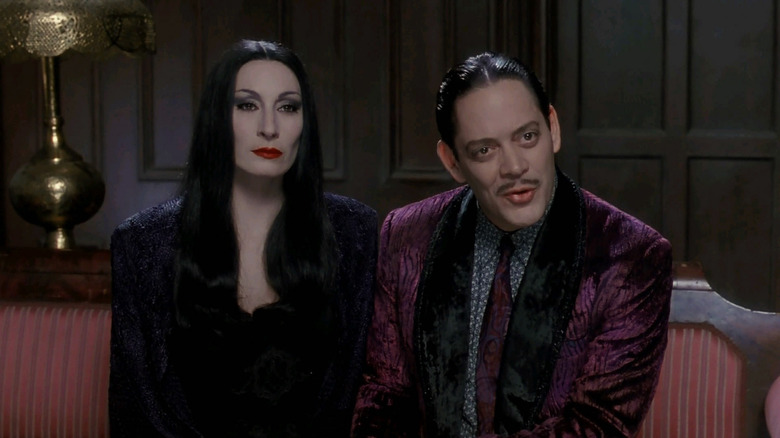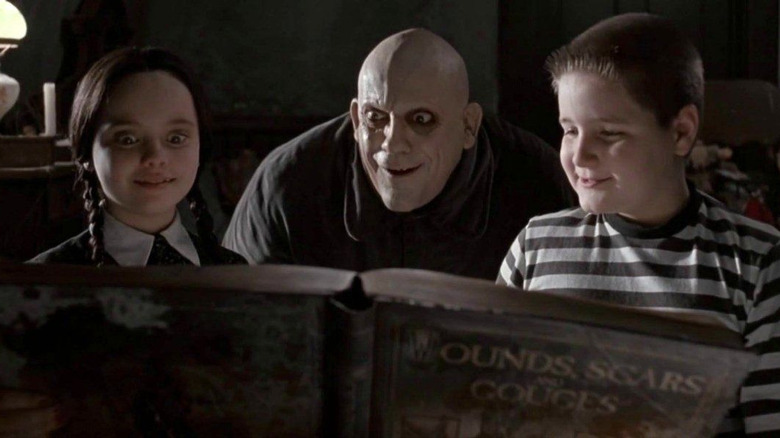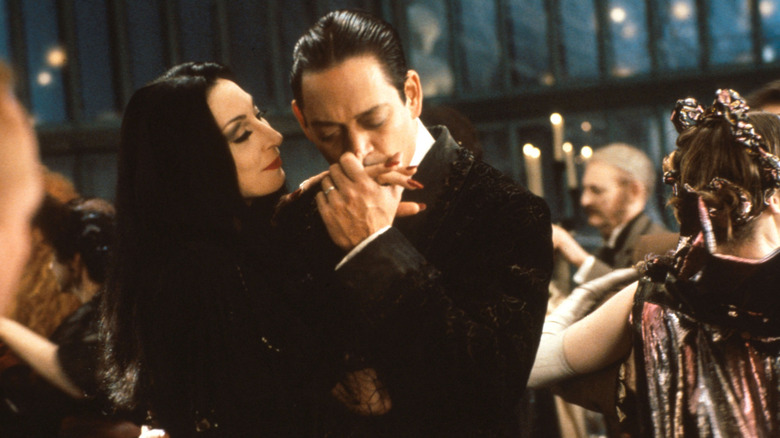Arguments Over 1991's Addams Family Were Solved By A Grown Man In A Pillow Fort
Barry Sonnenfeld's 1991 film adaptation of "The Addams Family" came out right when pop Goth fashion was hitting the mainstream. Goth culture, of course, first evolved in England during the rise of bands like Siouxsie & the Banshees, Bauhaus, and The Cure, and Goth characters started appearing in American horror movies in the mid-1980s. One of the first mainstream Gothic film icons of the time was probably Lydia Deetz, the character played by Winona Ryder in Tim Burton's 1988 film "Beetlejuice." After that, '90s teens began to affect a whimsical adoration of the macabre, and Tim Burton's films exploded in popularity. In fact, his 1989 rendition of "Batman" owes more to Goth culture than to comic books.
"The Addams Family," based on the 1960s sitcom and the comic strips by Charles Addams, was eaten up by a Goth-loving public. Audiences were ready to reject old-world, Reagan-era squareness and embrace joyous destruction and gleeful violence that the Addams family represented. They lived in a haunted mansion, played in a graveyard... and they all deeply loved each other. After the bloated blockbusters of the '80s, it felt like pop culture was passing through the looking glass.
Getting "The Addams Family" made, however, was a fraught process. Director Sonnenfeld had previously worked as a cinematographer, shooting films like "Raising Arizona," "Big," and "Misery," and was to make his directorial debut with "The Addams Family." What he wasn't prepared for in the transition was having to butt heads with a producer. Scott Rudin produced "The Addams Family," and he and Sonnenfeld argued constantly. In a 2020 interview with Entertainment Weekly, Sonnenfeld recalled a creative impasse he had reached with Rudin and that he had to stand his ground ... by hiding in a pillow fort like a five-year-old.
Disagreeing on everything
By Sonnenfeld's description, he and Scott Rudin disagreed on everything (outside of the script, written by Paul Rudnick). They disagreed on the cast, on how the costumes should look, the sets, and even the props. Eventually, the meetings between the director, the writer, and the producer devolved into petty yelling and immature behavior. Sonnenfeld noted mentally that if his producer was going to behave in an immature fashion, then he should respond in kind. Couch cushions got involved. Sonnenfeld said:
"Rudin, Rudnick, and I would meet in his office and Scott would charmingly lie about everything we had opposing opinions about or he would just yell at me. Scott's screaming was fierce. I realized the only way to deal with it was to out-juvenile him. When he would start to scream at me, I would get off the couch and remove all the bolsters and pillows. Using the back and bottom bolsters as building blocks, I would turn them into walls and build a fort on top of the couch. Crawling into the one end, I had left open I'd stuff a pillow into the gap and yell: 'I can't hear you. I'm in the fort.'"
This may be a common experience for anyone who grew up in a home with sofas. Many a child has likely pulled the cushions off a couch, built rudimentary walls, and hidden inside their makeshift "fort" as a means of ignoring their parents. Sonnenfeld's daughter, Chloe, wouldn't be born until 1993, so the director was merely tapping into his own immature impulses.
It worked. Sonnenfeld remembers Rudin's frustrated response.
How to negotiate with Scott Rudin
Sonnenfeld transcribed his exchange with Rudin for EW, which ran thus:
'Barry. Get out of there.'
'I think you may have said something, but I can't hear you because of how thick the walls are in this fort.'
'I'm serious. Get out of the fort right now, Sonnenfeld. I am busy and this is stupid.'
'Can't hear you.'
Rudnick would confirm, that indeed, I was in a fort, and if Scott wanted me to hear him he'd have to yell louder.
'Seriously, Sonnenfeld. GET OUT OF THE FORT. I have work to do.'
'If you say you're sorry, and promise not to yell, I'll get out of the fort.'
'Ucchhh. I'm sorry. OK? C'mon. We have work to do.'
Remember, kids. When you are you are bing impetuous and disobedient with your parents, and you're prone to making unreasonable demands, you are actually building important life skills and business acumen that you'll be able to ply later in life.
Well, if you ever find yourself working for Scott Rudin.
Sonnenfeld recalls an additional odd aspect of his negotiation from within his cushion fort: Rudin didn't knock it over. Rudin, he said, could easily have removed the cushions, returned them to the couch, and continued to speak to Sonnenfeld like an adult, but Rudin, perhaps without realizing it, played along. Rudin yelled but then apologized. Sonnenfeld likely understood that his producer was childish enough to only respond to childish behavior. It might have been savvy, given that Rudin has been accused of abuse and misconduct; his anger at Sonnenfeld was only one example of career-long habits of mistreatment.
Ultimately, Sonnenfeld's stubbornness was a boon for "The Addams Family." It was widely beloved and made $191 million on a $30 million budget.


